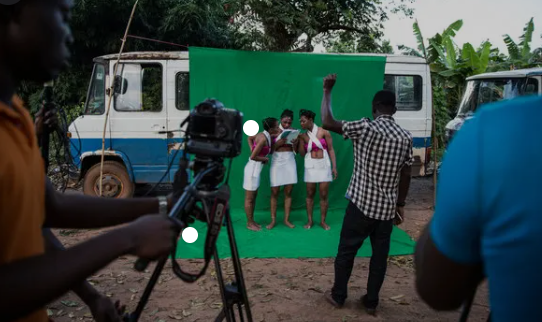BY MICHAEL DUGERI
From Netflix’s red carpets to YouTube’s endless feeds, Nollywood has been swept up in the currents of global tech. The result is an industry bursting with content but starving for the kind of storytelling that once made the world take notice.
In the early 2000s, Nigeria’s film industry, affectionately known as Nollywood, stood as a symbol of what was possible when creativity met resilience. Born in the cramped editing rooms of Lagos, fuelled by little more than handheld cameras, audacious storytelling, and street-corner marketing, Nollywood overcame piracy, poor infrastructure, and limited funding to become the world’s second-largest film industry by volume. Against all odds, it was one of Nigeria’s few unambiguous bright spots, an industry that made our culture exportable, our stories visible, and our people proud.
Then came the 2010s, and with them, the wave of emerging technologies that would begin to reshape the industry. On the one hand, affordable digital cameras, editing software, and the spread of mobile internet lowered barriers to entry. Talented filmmakers could reach audiences directly, and Nigerian content could travel faster than ever before. On the other hand, the easy accessibility of free online content, from YouTube to Instagram skits, was beginning to eat into cinema audiences and DVD sales. By the mid-2010s, the industry was at risk of stagnation. Budgets were flat, scripts increasingly recycled, and the initial creative energy was showing signs of fatigue.
Advertisement
And then, like a scene-stealing character entering in the second act, Netflix arrived.
Between 2016 and 2022, Netflix invested around $23 million into Nigeria’s film ecosystem, creating over 5,000 jobs and contributing nearly $39 million to GDP. It commissioned high-profile projects like The Black Book, which achieved global visibility and proved that Nollywood could produce titles with the technical polish and storytelling depth to stand alongside international cinema. For a moment, it felt like the tide had turned. The cash infusion and international exposure offered by the streaming giant promised to push the industry into a new era of quality, ambition, and global competitiveness.
But the romance didn’t last.
Advertisement
Nigeria’s low subscription price point (about $4.48 a month, compared to $7.99 in South Africa) meant slim margins. Add widespread password-sharing, a stubbornly small subscriber base of under 200,000 in a nation of over 200 million, and rampant piracy, and the economics stopped making sense. By late 2024, Netflix announced it would stop commissioning Nigerian originals. While it would still license existing films, the steady flow of new, big-budget productions dried up almost overnight.
What followed was a creative pivot, one that has redefined Nollywood’s present, and perhaps its future.
With fewer opportunities for studio-scale productions, many actors, long dissatisfied with the dominance of a few producers and marketers, decided to become “producers” themselves. The quotation marks are deliberate. These are not producers in the traditional sense of financing, developing, and shepherding projects through months of pre-production. They are, in effect, content creators, churning out low-budget films (sometimes shot in under a week) and uploading them directly to YouTube for a cut of the ad revenue.
And it’s not just a handful of players. Today, almost every recognizable Nollywood face has a YouTube channel, which they brand as “TV.” Some release new “movies” every week, filmed in a single rented location, with scripts written in days and post-production so rushed that crew members occasionally appear in frame. The model works for quick visibility and instant monetization, but it does little for artistic growth or long-term audience trust. The streaming gold rush promised a renaissance, what we got was a content stampede. The danger isn’t that Nollywood will disappear, it’s that it will drown in its own content.
Advertisement
The result is a flood of content—some charming in its scrappy enthusiasm, much of it indistinguishable, formulaic, and forgettable. The volume-driven economics of YouTube reward speed over craft. The more you upload, the more you can earn. But that same cycle eats away at the patience and discipline required to produce lasting art. When every actor becomes a producer, the art risks becoming an assembly line.
Nollywood’s current moment is therefore a paradox. On the surface, the industry has never been busier; in reality, it risks eroding the very qualities that once made it so compelling. YouTube has democratized access, allowing anyone with a camera and a story to publish. But in replacing the discipline of cinema and studio production with the frenzy of “shoot-and-upload,” we risk trading a legacy of cultural impact for a glut of disposable entertainment.
I believe that Nollywood isn’t running out of stories, it’s running out of patience for telling them well. The truth is, no industry can thrive long-term without balance, between accessibility and quality, speed and craft, independence and collaboration. You can’t build a global film legacy on a shoot-and-upload schedule. Quantity may feed the algorithm, but quality feeds the culture. Nollywood needs investment not just in individual films but in the ecosystem: funding models that reward ambition, distribution networks that protect intellectual property, training programs that sharpen skills in writing, cinematography, and post-production, and cultural policies that treat film as a national asset, not just a commercial pastime.
The irony is that Nollywood has already proven it can do this. The same industry that grew from VHS stalls in Alaba into a global powerhouse can reinvent itself again. But that reinvention won’t come from chasing the algorithm. It will come from re-centering on the very things that made the world fall in love with Nigerian cinema in the first place: bold storytelling, deep cultural authenticity, and the courage to invest time and resources into work that lasts.
Advertisement
Nollywood’s struggle is only one chapter in a larger story about technology’s double edge—its power to open doors and its tendency to close others just as quickly. There are no easy fixes, only hard choices about what kind of industry, and culture, we want to build in its wake.
Michael Dugeri is a Toronto-based digital policy expert whose work explores the impact of emerging technologies on creative industries in Africa.
Advertisement
Views expressed by contributors are strictly personal and not of TheCable.
